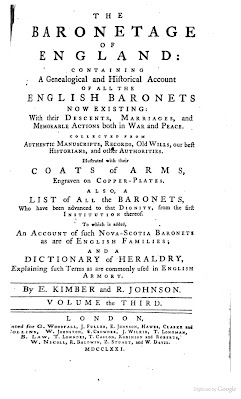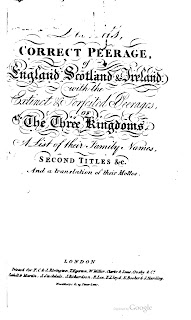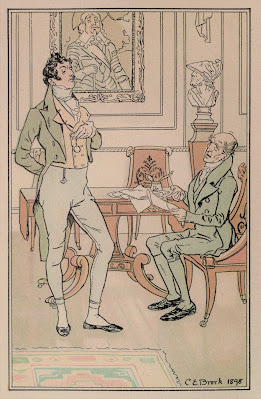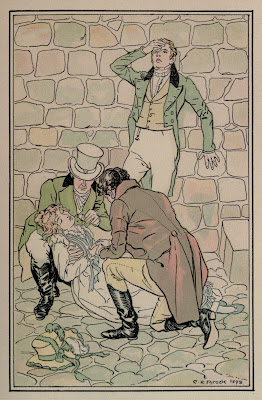Here are some photos of my Jane Austen July journal. I really didn't read or watch anything that wasn't Jane Austen-related for the whole month! Any movies mentioned, I've linked to their trailers, except for Mansfield Park because BLEH. Okay, here we go . . .
Tuesday, August 8, 2023
Jane Austen July Journal: A Few Pages
Sunday, August 6, 2023
Genuine FAUX Cabinet Cards
My sister is spiffying up display cabinets in the university science building she manages. She's very good with arranging curiosities and artifacts. Some of them have been donated by the family of a member on staff. He had a picture of his great-grandfather holding a skull in medical school, and here's the skull:
Sunday, July 30, 2023
PART 2: "Persuasion" & The Regency Time Period
The Regency Time Period
I have been slagging through Elegant Etiquette in the Nineteenth Century by Mallory James. It's like doing Manners Math. A person's title determines their rank in society and thus, precedence. Precedence boils down to who goes first: who speaks first, who enters or leaves a room first, who enters or leaves a carriage first and where they sit in the carriage (forward facing or backwards facing), etc. Their title determines how they are addressed and how introductions are made--IF they may be made. Apart from the royal family, a duke is the highest rank. A duke and an earl in the same room is obvious. The duke is addressed as "Your Grace" and introduced to the earl (Lord So-And-So). Easy-peazy. UNLESS . . . there are two earls. Then the duke is introduced to the eldest earl--UNLESS, the older lord's family is more recently given the title of earl than the younger earl; in which case the younger earl is introduced first.
I have temporarily DNF-ed (Did Not Finish) Elegant Etiquette and just binge-watched a bunch of Octavia Cox. She breaks it down and makes it easier to understand in What CLASS Are The Bingleys. Here's a summary of GENERAL RANKINGS:
- Nobility/Aristocracy = own estates/land, titled. House of Lords
- Gentry = own land/estates, but not titled. House of Commons (but elected)
- Trade/Merchants/Commercial People = often wealthy, but unless knighted, not called "Sir Anything."
- Common Trades = butcher, baker, blacksmiths, etc.
- Peasantry = everyone else; many become factory workers in the Industrial Revolution.
RANKING of NOBILITY/ARISTOCRACY; members of the Peerage:
- King
- Prince
- Duke
- Marquess
- Earl
- Viscount
- Baron
"But I have lots of money!" It doesn't matter.
Wealth was important, but even if you made more money than someone in the aristocracy, you still adhered to societal conventions. There were some professions in the middle class that were more desirable than others. For example, even if a tanner made way more than a lawyer, the lawyer had greater rank, status and privilege. In Persuasion, Mary objects to Henrietta's interest in her cousin Mr. Hayter because he wants to be a clergyman. He's educated, will inherit his family's estate as the eldest, but with no title, he's not high-status enough for someone related to her. She doesn't really care about Henrietta, it's Henrietta's association to Mary and her family that she cares about. On the other hand, if Mr. Hayter were to be an archbishop, then he would be higher up--not enough for Mary, I'm sure!
"And all that remained was to marshall themselves and proceed into the Concert Room, and be of all consequence in their power."
Speaking of Mary, let's talk ladies. Something that Jane Austen emphasizes is Mary's preoccupation with precedence over her mother-in-law Mrs. Musgrove, because her father was born a baron. So she was born into the aristocracy and thus, superior. This means she's the first to enter a carriage, the first to enter into dinner. She would be "higher" up than Mrs. Harville, who is only married to a sea captain, with no title or land. The same rules for gentlemen apply to ladies; the superior lady is introduced to the lower-ranking woman. But why would Mary be so obsessed? Look to her upbringing. In addition to vanity, her father is obsessed about status, title, rank, and precedence.
From the age of 16, Elizabeth as the eldest, was the lady of the house after Lady Elliot died. This meant that she was first after her father, UNLESS Lady Russell were present, in which case, she followed behind Lady Russell because she was a lady and older. Prior to being married, Mary would have lived for years having to trail behind Elizabeth as the eldest, but also Anne because she was older, too. So there would be Mary bringing up the rear, which must have vexed her greatly. She would have felt a smug satisfaction on being able to go ahead of Anne after she married--not that Anne would have cared.
When Anne marries, "She had something to suffer . . . in seeing Anne restored to the rights of seniority" but she consoles herself that "Anne had no Uppercross Hall before her, no landed estate, no headship of a family; and if they could but keep Captain Wentworth from being made a baronet, she would not change situations with Anne." In other words, she's still better than Anne in status, and thus wins. Even if Captain Wentworth does buy an estate and thus establish himself as landed gentry, he's still not "as good" as someone who's titled.
INTRODUCTIONS
Introductions were a big deal. You didn't introduce yourself; you had to have a mutual acquaintance introduce you. And it would behoove that mutual acquaintance to take it seriously lest he besmirch his own name if something goes awry. You would need permission from the superior ranking person to make the introduction. If you'll pardon a Pride & Prejudice reference, this is why people didn't just go up to Mr. Darcy at the Assembly Hall and introduce themselves. And he was clearly not seeking to be introduced to anyone there. This is also why it was such an affront for Mr. Collins to introduce himself to Mr. Darcy at the Netherfield Ball. Such impudence! Who did he think he was, just because his house was divided by "only a lane" to Lady Catherine's estate?
There was also a whole set of rules for walking about towne. Lydia yelling out to Denny in Meryton was a clear indication early on about her lack of propriety and character. It's why she was admonished by her older sisters. Jane Austen was showing the reader her lack of good judgement and poor conduct early on. We knew Lydia was going to be in trouble!
HISTORY HAPPENED
Beyond the accepted social customs and acknowledgement of rank, there is also history happening. Jane Austen never specifically mentions the Napoleonic Wars (1803-1815) but soldiers and naval officers "are in her head!" Or at least peppered throughout her novels. Going into the navy or joining a regiment was a career option for non-first born heirs and men with no other clear career path. Jane Austen had brothers in the navy, so she was well-familiar with the jargon and culture of naval society.
TYING IT ALL TOGETHER
Now that we understand title, rank, precedence, status and history, let us revisit what Jane Austen says of Sir Walter Elliot, shall we?
"Sir Walter Elliot, of Kellynch Hall . . . never took up any book but the Baronetage." This book was a list of all the baronets in the country and was his source of pride and superiority over others. He was SIR Walter Elliot and it said so in this very-important book! Not only was his family listed, but he "improved" it by adding additional information of himself & family: births, deaths, marriages. This might not seem like a big deal, but this is what people did in their family bibles--which we know Sir Walter Elliot does NOT read! So the Baronetage is essentially his bible.He dismisses other people based solely on a lack of title; they are not entitled like he is. What Jane Austen and readers would have known is that the chest-puffery of Sir Walter Elliot makes him look even more of a vapid buffoon than he already is. He is not a baron (lowest of nobility/aristocracy), but a baronet. He's titled, and acts as if he's aristocracy, but he's not. In fact, there are two books: The Baronetage, and the Peerage, which is a separate list of the different levels of aristocracy.
So what is a baronet?
A baronet is in between the aristocracy and the gentry. It is a title not in the ranks of the aristocracy, and has no political power. The Baronetcy was created by King James the First who sold this new title for a thousand pounds per man.
King James: It's 1611. I need money for the soldier thing happening in Ireland. I know! I'll send out a sales force to canvas the country and sell status to rich people.
Joe Merchant: I'd like a baronetcy, please.
King's Sales Guy: Do you have a thousand pounds? (269271.55 pounds or $346,156.33 today)
Joe Merchant: Here it is. And does this title inherit to little Joe Junior?
King's Sales Guy: Thank you, Sir Joe Merchant and, er, any future Joe Merchant descendants.
Joe Merchant: I'll just be on my way to Parliament . . .
King's Sales Guy: Nope. You have no political power.
Joe Merchant: But I'm a baron!
King's Sales Guy: Baron-ET. But the knighted guy down the street can't pass down his knighthood to his son. YOU can. His son will just be "Mister."
Joe Merchant: Right! Off to buy an estate of at least 500 acres so I can become gentry!
Sir Walter Elliot has a large house but he doesn't grow crops or manage land and he certainly doesn't have 500 acres. He is not landed gentry, he is not aristocracy. He is in between. He could stand to be a bit more humble and kind to others. That is one of the points Jane Austen makes about him. At the end of the book, untitled Captain Wentworth helps Anne's friend Mrs. Smith out her financial predicament. He does what William Elliot refused to do, and essentially caused. Sir Walter Elliot would never have even considered helping, because she was a nobody. This is not to diss a baronet, but specifically Sir Walter Elliot because he's such a judgey blowhard who thinks himself superior when . . . he's just not. He's just entitled--literally and figuratively!
For a few laughs, here's Eddie Izzard explain the royals:
MORE RESOURCES:
Status, Rank & Class in Jane Austen's Novels by John Mullan.
Now, in the 21st century, Sir Walter Elliot could consult the Debretts website.
Wednesday, July 26, 2023
DIY Fountain Pen Board
For video instructions click HERE.
Tools, Supplies & Materials used:
Non-stick Scissors (not the exact ones I have, but they look comparable to mine)
Elegant Etiquette in The 19th Century
Nik The Booksmith Jane Austen printable kit
Tuesday, July 25, 2023
Botanical Spiral Notebook
This is a spiral notebook I made for a friend. I've covered her full name with a post-it note for privacy's sake.
Monday, July 24, 2023
Part 1: "Persuasion" by Jane Austen
This began as a supplemental to a video review of the Netflix version of Persuasion and quickly turned into a full-blown essay. I am a year late to the Netflix Persuasion party and even though many people have spoken elegantly about this version, I find that my passion for Jane Austen, and Persuasion in particular, has ignited within me an opinion of consequence for which I cannot remain silent. How's that for sounding Jane Austen-y? Before we get started, I'm going to write this as if you might be somewhat familiar with Jane Austen, and in particular Persuasion. It will make more sense if you are, although you can slag through it if you're not!
There are three parts (and blogposts) to this discussion:
1. Persuasion the book: understanding Anne Elliot's character and basic plot points.
2. The Regency time period: understanding societal mores; the importance of title, rank, & precedence.
3. Persuasion the movie: how it differs in the characterization of Anne Elliot, how it changes the plot, how it ignores social conventions of the time, and how it is ignorant of bonnets.
WHERE ARE THE BONNETS, PEOPLE?!
Persuasion, The Book
First and foremost, Persuasion is a love story--and that would have made the perfect Fleabaggy first line, minus the jam over the lip: "This is a love story." Because it is. It is NOT a comedy. There is not a lot of action in it. It is a story of loss and yearning and the regret that Anne Elliot feels having refused Captain Wentworth's proposal.
"A few months had seen the beginning and end of their acquaintance; but not with a few months ended Anne's share of suffering from it. Her attachment and regrets had, for a long time, clouded every enjoyment of youth, and an early loss of bloom and spirits had been their lasting effect."
When the novel begins, Anne is 27; quiet and unassuming, "with an elegance of mind and sweetness of character, which must have placed her high with any people of real understanding, was nobody with either father or sister; her word had no weight, her convenience was always to give way--she was only Anne."
Jane Austen's description of Anne encourages the reader to connect the dots and draw conclusions. As with all her novels, she describes, she doesn't tell outright. What does one deduce reading this? Anne was "nobody" to her father and two sisters.
Nobody. Let that sink in.
"Any people of real understanding" would have recognized her "elegance of mind and sweetness of character." This means that her father and sisters are shallow, don't see her or acknowledge her for who she is, and don't value her intelligence or her kindness. "Her word had no weight." They don't solicit her advice or listen to anything she has to say. "Her convenience was always to give way." It was easier to go along and be passive than try to speak up and persuade anyone of her opinion. Why? She is nobody to them. She doesn't matter.
Vanity was the beginning and the end of Sir Walter Elliot's character; vanity of person and of situation. He had been remarkably handsome in his youth; and, at fifty-four, was still a very fine man. Few women could think more of their personal appearance than he did, nor could the valet of any new made lord be more delighted with the place he held in society. He considered the blessing of beauty as inferior only to the blessing of baronetcy; and the Sir Walter Elliot, who united these gifts, was the constant object of his warmest respect and devotion.
Anne's bombastic father, who values appearances--only second to social rank, thinks Anne is "haggard" and her younger sister Mary is "coarse" but is a bit "improved" by having married, thus having a higher social ranking. Mary values Anne only in what she can provide for her; whether attention or babysitting services. When it's decided that the family will move to Bath in order to "retrench", Mary says to oldest sister Elizabeth, "I cannot possibly do without Anne." To which Elizabeth replies, "Then I am sure Anne had better stay, for nobody will want her in Bath." Again with the nobody.
RETRENCHING: Regency-speak for budgeting.
When Sir Walter asks for Elizabeth's assistance in retrenching, all she can think of to do is NOT buy new furniture for the drawing room, and to "cut off some unnecessary charities." As an afterthought, "she afterwards added the happy thought of their taking no present down to Anne, as had been the usual yearly custom." Because charities are "unnecessary" and Anne doesn't matter.
The only person in Anne's life who has any affection for her is Lady Russell, who was the "one very intimate friend" of Anne's mother. Lady Russell is the guiding force for Anne, after her mother's death when she was 14. When Sir Walter asks for her discreet assistance in an attempt to retrench, "she did what nobody else thought of doing: she consulted Anne, who never seemed considered by the others as having any interest in the question."
Anne is quiet, reserved, thoughtful, kind, caring, compassionate, gentle. Even though her family neglects her, she is helpful and caring toward them. She indulges and attends to her sister Mary, who had inherited "a considerable share of the Elliot self-importance." She doesn't complain or say anything unkind or critical of anyone. They don't ask her opinion and she doesn't give it. She certainly doesn't share her personal feelings. Why would she? They don't care.
Once established at Mary's home, Anne is everyone's confidante. Here is my paraphrasing of their conversations:
Mary: I wish Charles would take my illnesses more seriously.
Charles: I wish Mary would not think herself so ill all the time.
Mrs. Musgrove (Charles's mother, Mary's MIL) I wish Mary were more like you with the children. They are so unruly I end up having to bribe them with cake.
Mary: Mrs. Musgrove gives them too many sweets and spoils their dinner for when they come home!
Anne listens quietly and offers support and sympathy. Later, she listens to clueless Mary discussing Captain Wentworth and which of the Musgrove girls he should marry. She listens to other people discuss his merits, his handsomeness, his eligibility. She does her best to be supportive. And she suffers silently.
This gives you an idea of who Anne is. She doesn't draw attention to herself. She is in the background as a supportive person wherever she can be helpful, steadfast and reliable. She stays with her nephew so that Mary may join Charles for the festivities at the Musgrove's--although her greater motivation is to avoid seeing Captain Wentworth. She does her best to avoid him for as long as she can. And when she finally does see him, she gets through it and retreats afterwards, consoling herself that she survived it.
When she is in a social situation, she acts as the support: she plays music so that others may dance. No one else seems to notice. When Wentworth asks Louisa if Anne ever dances, she answers that she doesn't dance and just likes to play music. That's the extent of it. We could credit Louisa's youth for her lack of observation of what Anne might truly be feeling, but what of the others? They don't care. Except: Wentworth noticed. And he knew she liked dancing because he had danced with her.
Anne has a quiet strength and is calm in the face of a crisis; both when her nephew is injured and when Louisa falls in Lyme. It is she who is thinking clearly enough to send Mr. Benwick for the apothecary since he lives in Lyme and would know the way. She volunteers to stay with Louisa to help and only relents to go back home when Mary throws a fit. Mary, who is so ready to be slighted and offended at every turn, sees it as some sort of competition. She sees herself as more important than Anne because she's the sister-in-law and "closer" to Louisa. It has nothing to do with her caring or affection for Louisa. Anne is ready to sleep on the floor next to Louisa's bed. We know Mary's not having any of that!
But why is the novel called "Persuasion?"
Anne allows herself to be persuaded by Lady Russell to break off her engagement to Captain Wentworth. But we must not be too severe upon Lady Russell. To be fair, in her affection for Anne, she was thinking what she thought was best for her. Anne was only 19, Wentworth was a first love, and he had no social status or large fortune. Add to that, he is a naval officer which means that he would be at sea, possibly at war, for months or years and might not come home having died or been lost at sea. These were not good prospects to her and there was not much to recommend him to Anne in her eyes.
We see that she is persuaded by Lady Russell because she truly loves and cares about Anne. She is the maternal figure in Anne's life, after her mother's death. And Anne is young, seeking guidance. While Anne routinely "gives way" to her family in most matters, she's not a pushover. When her father orders her to cancel her appointment with her friend Mrs. Smith to visit the dowager with them, she refuses. We see Anne's true strength of character in her loyalty to her friend. Even though her father ridicules her for her friendship and criticizes her friend as a nobody. She remains steadfast to her friend who has fallen into poverty, has no social status and lives in the wrong neighborhood.
AND who gives her carriage to take Anne to her friend? Lady Russell. Lady Russell, a member of polite society, still recognizes, values and supports Anne's kindness and friendship. And she must know how supportive Mrs. Smith was to Anne after Lady Elliot's death.
Mrs. Smith serves another purpose in the story: she validates Anne's ambivalent feelings towards her cousin, William Elliot. He's charming, but she doesn't know just how scheming and devious he is. Not only does Mrs. Smith tell her own story, but she has proof in Mr. Elliot's own writing of a letter. Through Jane Austen's description, we discover later that Mr. Elliot's attention towards Anne was motivated by selfish inclinations. As the legal heir of Sir Walter's estate, it was suspected that he was going to include a clause against Anne's father marrying Mrs. Clay as part of his wedding agreement to Anne. The logical marriage partner for him would have been Elizabeth; but she was too entrenched in her friendship with Mrs. Clay. Before the move to Bath, when Anne was bold enough to address her concerns about Mrs. Clay's intentions to Elizabeth, Elizabeth disregards and criticizes her. How could Anne possibly know anything when she wasn't even friends with Mrs. Clay like she was? And then both Elizabeth and Sir Walter are shocked--SHOCKED! when they discover how scheming she was. But she "wins" in a way because in quitting Bath and joining William Elliot in London, she has the advantage of financial security she was after and he, in turn, has the advantage of her not marrying Sir Walter and possibly having an heir to usurp him.
We can't end a discussion of Persuasion without touching upon THE LETTER.
"He drew out a letter and placed it before Anne with eyes of glowing entreaty fixed upon her."
Oh, that letter! Quite possibly one of the most heartfelt fictional letters of all-time, wherein we discover along with Anne, that Captain Wentworth is not indifferent to her. He is not unforgiving or resentful. He is just as wounded as she.
I must speak to you by such means as are within my reach. You pierce my soul. I am half agony, half hope. Tell me not that I am too late, that such precious feelings are gone for ever. I offer myself to you again with a heart even more your own than when you almost broke it, eight years and a half ago . . . . I have loved none but you . . . .
*Le SIGH*
After they are reunited, they later have a conversation in which Wentworth discovers that if he had come back only a year later and repeated his proposal, Anne would have accepted. But he stayed away in angry pride and misunderstanding for another six years.
Jane Austen's artful hand guides the reader through nuance. Her humour is in the description of characters and the folly of their behaviour. She describes characters in a scene. She is subtle and invites the reader to read between the lines, make connections and deductions that move the story along. William Elliot says nothing overtly of his scheming. We discover it through Mrs. Smith's story and Jane Austen's narration after he learns of Anne's engagement to Wentworth.
Admiral Croft doesn't exclaim, "Your dad sure is a Narcissist!" He marvels at the number of looking glasses in his dressing room and says something complementary, while also mentioning that he removed them and has a little mirror in the corner for his own shaving purposes. He doesn't have to say anything directly about Sir Walter; his description of the dressing room says it all. Jane Austen already set up the framework of Sir Walter's character at the beginning of the novel:
"Vanity was the beginning and the end of Sir Walter Elliot's character; vanity of person and of situation."
We know what kind of shallow, classist person he is. In modern terms, we would characterize him as a grandiose narcissist. He wants to retrench without losing any of the luxuries, looks of wealth or status. He openly disdains "ugly" people, poor people, and the fact that the word "gentleman" is too liberally applied to men without land or title. He is "dismayed" at the crow's-feet around Lady Russell's eyes, and declares that naval officers look too old and "orange" from the sun. He has OPINIONS about all these things and shares them freely because he's entitled--literally, as a baron. And that is the irony that Jane Austen so cleverly communicates, because when you understand the class structure of 19th century England, you understand that really, a baron is at the bottom of the aristocratic hierarchy.
But we'll talk about that in Part 2: The Regency Time Period. In the meantime . . .
Monday, July 17, 2023
Tuesday, July 4, 2023
Caroline Bingley Vexing Mr. Darcy
Also, it strikes me that Caroline is a typical sister in throwing her brother under the carriage for his alleged lack of writing skills. Ha!
















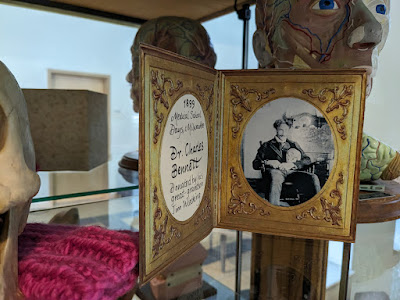




.jpg)
